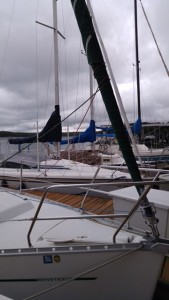According to 2015 U.S. Coast Guard statistics, May through September is the peak period for recreational boating accidents. Florida, Minnesota, Michigan, and California lead the nation in the number of registered boats while Florida regularly leads the nation in damage claims of over $2000—far outpacing California at a distant second.

While boat and watercraft insurance is an important line for many insurers, the nature of boating can lead to large property, casualty and liability claims. There are several areas where marine safety and vessel maintenance can significantly reduce both the incidence of claims and the dollar value of payouts. This blog post will focus on sailboats, powerboats and personal watercraft.
Risks to boats include:
- Sinking
- Collision with other vessels
- Collision with fixed and submerged objects
- Grounding; fire and explosion
- Wind and weather
- Hurricanes
- Lightning strikes
- Theft
- Injuries
- Damage to vessels being stored or trailered
Here are a few operation and maintenance strategies designed to reduce boating claims:
- The most important rules for safe boating are training and vigilance. Many states do not require any certification to operate a boat, and some don’t even have age restrictions. All boat owners and passengers should take a boating safety course covering safe practices, safety equipment, navigation rulesand accident prevention. A list of boating safety courses and other information can be found at www.uscgboating.org
- Boats can sink at sea as the result of collisions and heavy weather, but they can also be done in by a lack of proper maintenance. The two most critical areas overlooked are the hull and the engine/electrical systems, which can lead to sinking or fire and often the total loss of the boat.
- Boat owners should pay close attention to marina maintenance issues that may pose a risk to their boats, including overheated shore power systems, stored combustibles, unsafe welding operations or corroded fuel lines. These issues should be reported immediately to marina management.
Forensic marine professionals are experts in recreational watercraft, yacht, commercial shipping and marina type fires. In addition to fire related incidents, forensic engineers can perform accident reconstructions, ocean engineering and code compliance inspections and reviews. These professionals also have experience working along with maritime attorneys, marine surveyors, heavy equipment operators and other experts on large joint scene examinations.
While it is impossible to prevent all boat-related accidents and losses, you can rest easier knowing there are experts who can help with loss prevention and recovery. Please feel free to share your questions and ideas with us. Learn more about Unified and how we are here to meet the needs of your organization.
Patrick Hudson, PhD, PE, District Manager/Forensic Engineer
Unified Investigations & Sciences, Inc., a Sedgwick company